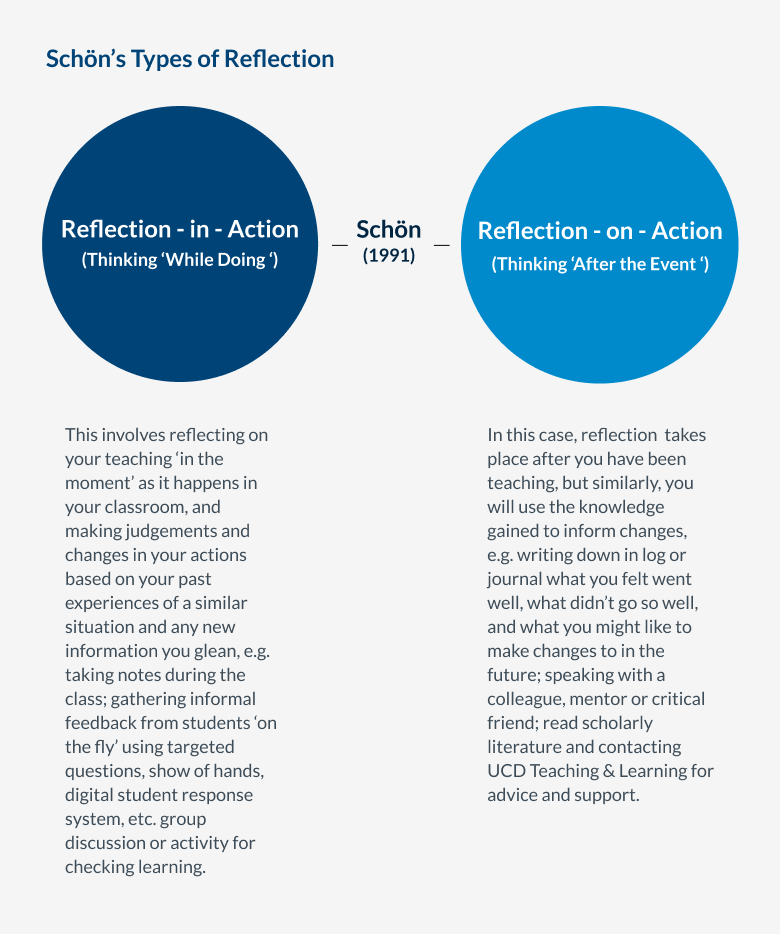Reflecting on Your Teaching
‘Central to all reflection is the attempt to see things differently’.
BROOKFIELD, 2017
Reflection is integral to the development of our practice as teachers (National Forum, 2018). Reflection incorporates thinking about various aspects of your teaching, gathering evidence of its impact on student learning, and planning for enhancement. There is no one correct way to reflect on your practice; the reflective process can be conducted in private or interactively, and the method you use will depend on what it is you would like to reflect on, and what you intend to do with the evidence you gather. For example, you may wish to create a case study for sharing with colleagues, collate evidence in producing a professional development portfolio, or keep a personal reflective journal, noting what you felt went well and what you would do differently in the future.
‘Our actions as teachers are based on assumptions we have about how best to help students learn … critically reflective teaching happens when we build into our practice the habit of constantly trying to identify, and check, the assumptions that inform our actions as teachers’. Brookfield, 2017
‘Expert teachers continually reflect on how they might teach even better’. Biggs & Tang, 2011
Reflective practice can have different meanings depending on the person and their personal or professional situation. In the context of teaching and the development of such, it refers to us, as teaching ‘practitioners’, engaging in reflecting on our teaching experiences on an ongoing basis, in order to learn from them for the benefit of future action (Fry, Ketteridge and Marshall, 2009). In other words, what is it that can we do differently to enhance the learning outcomes of our students.
Reflective Practice is about thinking back in order to move forward.
This transformative process requires that we put ourselves (‘I’) at the centre of our investigation, and this can sometimes be a challenge. Knowing what it is that you want to reflect on is the first important step; from there, you can begin to extract meaning from evidence you gather. In testing out different methods over time, you will find effective and time-efficient ways to gain maximum benefit from your reflection. Most importantly, it is in your and your students’ best interests that you carry out some reflection, and that you do it often.
The two main elements of Reflective Practice are ‘Doing’ and ‘Thinking’, which refer respectively to the action of teaching and the reflecting on that action.
What will I gain in reflecting on my teaching?
Reflecting on teaching is fundamental to personal and professional development, and has many benefits including:
- building your confidence in your own teaching style and strategies
- learning where your strengths lie and where you need to improve
- developing your ability to understand how your students learn and how best to support them in their learning
- increasing your flexibility in adapting your teaching and your openness to experimenting with new ideas and approaches
- identifying any assumptions in your teaching, and becoming more aware of the perspectives and cultural worldviews of others
- advancing you overall practice
The process of reflection encompasses both learning ‘through’, and learning ‘from’, an experience, and it must be both intentional and systematic if it is to be successful. During the process, you will challenge your own assumptions about your practice and make informed decisions about what you will do differently to enhance the learning experiences of your students.
There are many different forms of reflection. Schön (1991) identified two types that are particularly relevant in the development of teaching practice:

In both instances, you will build on previous learning, linking it to current and future practice. In other words, you will take a step back from your teaching, evaluate it, and extract meaning from it in order to make positive change.
In linking teaching and reflecting to learn more about how we teach and the impact it has on student learning, some practical models of reflective practice have been developed. The commonalities between these models are that they each encompass Schön’s concept of ‘Reflection-on-Action’.
For more information see our dedicated resource Reflective Practice Models
Video: Reflective Practice
Watch our short presentation of tips and techniques for Reflective Practice from our Teaching Toolkit Thursday series of webinars. NB: Please ensure you have cookies enabled on your browser to view the video. If you cannot see the video, go to your cookie preferences and allow targeting cookies.
References
- BROOKFIELD, S., 2017. Becoming a Critically Reflective Teacher. 2nd ed. San Francisco, CA: Jossey-Bass
- BIGGS, J. and Tang, C., 2011. Teaching for Quality Learning at University. The Society for Research into Higher Education. New York: McGraw Hill
- FRY, H., Ketteridge, S. and Marshall, S., 2009. ‘Reflective Practitioner’ Glossary entry, A Handbook for Teaching and Learning in Higher Education: Enhancing academic practice. 3rd ed. Abingdon, Oxon: Routledge (p. 509)
- National Forum for the Enhancement of Teaching and Learning in Higher Education, 2018. Reflective Practice in Teaching
- SCHÖN, D.A., 1991. The Reflective Practitioner: how professionals think in action. London: Temple
The University of Edinburgh Reflection Toolkit.